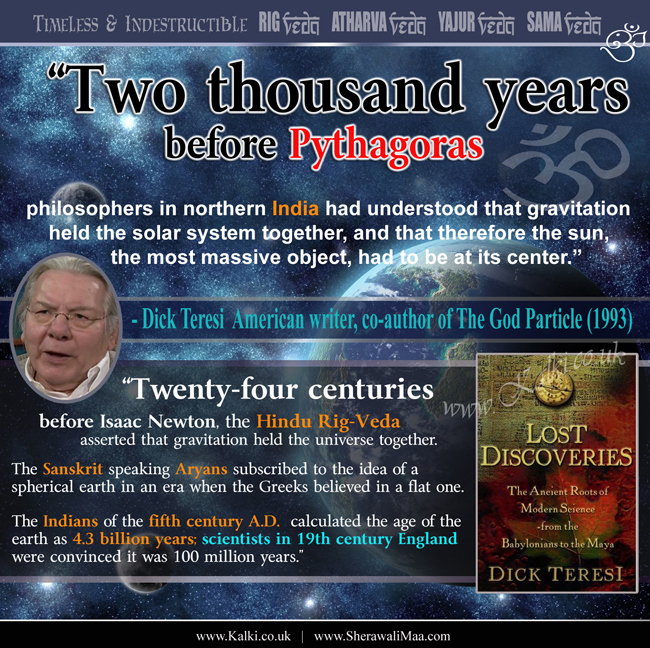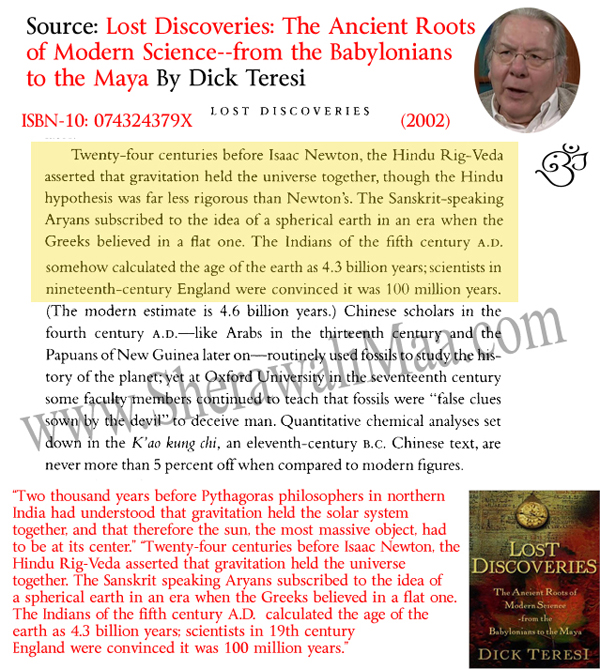 |
★ ♥ ★ A Multicultural Community that unites people from all over the world ★ ♥ ★ |
 |
 |
Dick Teresi: 4.3 Billion Years Ago |
 |

30-01-2017
|
 |
RHTDM
KALKI is offline
|
|
Join Date: Mar 2003
Location: I own a tent, it has a hole in it.
Posts: 47,407
Country: 
|
My Mood:

|
Dick Teresi: 4.3 Billion Years Ago
DICK TERESI AMERICAN WRITER, CO-AUTHOR OF THE GOD PARTICLE (1993) WROTE:
“Two thousand years before Pythagoras
philosophers in northern India had understood that gravitation
held the solar system together, and that therefore the sun,
the most massive object, had to be at its center.”
“Twenty-four centuries before Isaac Newton, the Hindu Rig-Veda
asserted that gravitation held the universe together.
The Sanskrit speaking Aryans subscribed to the idea of a
spherical earth
in an era when the Greeks believed in a flat one.
The Indians of the fifth century A.D. calculated the age of the
earth as 4.3 billion years; scientists in 19th century
England were convinced it was 100 million years.”
| - Source: Lost Discoveries: The Ancient Roots of Modern Science--from the Babylonians to the Maya By Dick Teresi
New York: Simon & Schuster, 2002.
Publisher: Simon & Schuster; Reprint edition (7 Oct. 2003)
Language: English
ISBN-10: 074324379X
| Many ancient civilizations left behind surprising contributions to the fields of mathematics, astronomy, cosmology, physics, geology, chemistry, and technology. Dick Teresi's book, Lost Discoveries, examines some of these diverse and little-known scientific and technological insights from the past. For example, in mathematics, the ancient Egyptians worked on the idea of the lowest common denominator and formulated a fraction table that required 28,000 calculations to develop. The Babylonians devised the first written math and used a place-value number system. Ancient East Indians invented the numerals 0 through 9 and made important contributions to geometry and trigonometry.
In the field of astronomy, the ancient Indians also correctly identified the relative distances of the known planets from the sun; the Chinese reported and recorded eclipses between 1400 and 1200 BCE; and the Arabs built the first observatories (most of the names of our stars and constellations are Arabic). Additionally, five thousand years ago, the Sumerians said the earth was round and a Hindu astronomer taught that the rising and setting of the sun were based on the earth's daily rotation on its axis.
In the eleventh century, Avicenna of Persia asserted that outward qualities of metals were of little use in classification (he stressed internal structure--well before Mendeleyev's periodic table of elements) and in 1041, Pi Sheng invented movable type. In South America the Quechuan Indians of Peru were the first to vulcanize rubber and Andean farmers were the first to freeze-dry potatoes. And, in Kahmir, iron suspension bridges were being developed. Lost Discoveries shows that the Golden Age of Greece and modern science are significantly based on the historical achievements of non-Western civilization. This is a story of time-binding and cultural diversity at its best. | www.SherawaliMaa.com





|
 Similar Threads
Similar Threads
|
| Thread |
Thread Starter |
Forum |
Replies |
Last Post |
|
Dick Teresi
|
KALKI |
History |
1 |
18-04-2015 13:57 |
 Posting Rules
Posting Rules
|
You may not post new threads
You may not post replies
You may not post attachments
You may not edit your posts
HTML code is Off
|
|
|
All times are GMT +1. The time now is 00:07.
|